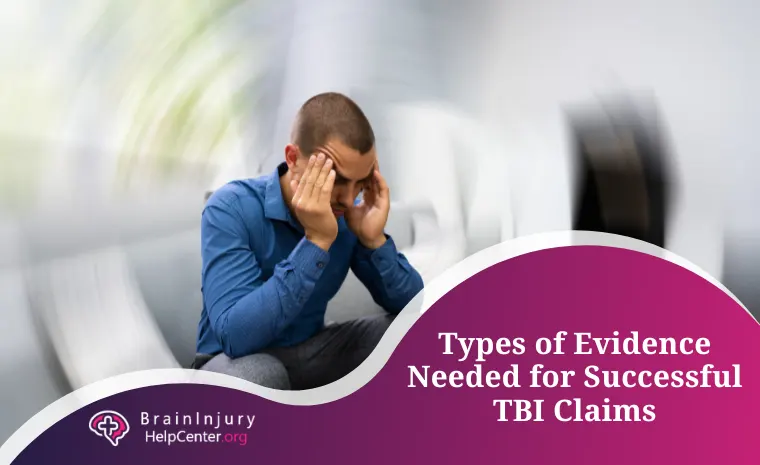Types of Evidence Needed for Successful TBI Claims
Traumatic brain injury is a serious medical condition that can have long-lasting effects on an individual’s health, well-being, and quality of life. If you or someone you love has suffered a TBI as a result of an accident or injury, it may be possible to file a claim for compensation. However, to have a successful TBI claim, you will need to provide specific types of evidence that support your case.
Diagnosed with TBI because of an accident?
In this article, we will discuss the different types of evidence needed for successful TBI claims and how to obtain them.
Understanding TBI and TBI Claims
Before diving into the types of evidence needed for successful TBI claims, it is essential to understand what a TBI is, what claim you are entitled to file, and how it works.
What is a TBI?
Traumatic brain injury is a serious condition caused by a sudden blow or jolt to the head, which disrupts the normal function of the brain. This type of injury can occur from a variety of causes, such as:
- Falls
- Motor vehicle accidents
- Sports-related injuries
- Assaults
Common symptoms of TBI can range from mild to severe cognitive function problems, including:
- Headaches and dizziness
- Confusion and memory problems
- Difficulty speaking or understanding language
- Changes in behavior
- Seizures
- Loss of consciousness and coma
It is important to seek medical attention immediately if you or someone you know has experienced a head injury and is experiencing any of these symptoms. Early diagnosis and treatment can help minimize the long-term effects of TBI and improve overall recovery.
What Should You Know About TBI Claims
TBI claims are legal actions filed by individuals who have suffered traumatic brain injuries as a result of another party’s negligence or unintentional harm. To file a TBI claim, the plaintiff (injured party) must show that the defendant (responsible party) breached a duty of care owed to them, resulting in the TBI.
These claims can be challenging to prove because they often involve complex medical evidence and require a high degree of legal expertise. Additionally, the amount of compensation awarded in successful TBI claims can vary widely, depending on the severity of the injury and the circumstances of the case.

Types of Evidence Needed for Successful TBI Claims
If you or a loved one have suffered a traumatic brain injury, you must take action and file a claim to seek compensation for damages. To do this successfully, you will need to gather crucial evidence, which can include medical records, diagnostic tests, expert opinions, and other documentation that can help prove liability and demonstrate the extent of your injuries.
Medical Evidence
One of the most critical pieces of evidence in any TBI claim is the injured party’s medical records. These records should include a detailed account of the injury, including the cause, symptoms, medical care, and treatment they received.
It is crucial to obtain medical records from all providers who have treated the injury, including emergency room physicians, neurologists, and physical therapists.
Diagnostic Tests
Aside from medical records, diagnostic tests are important in providing critical evidence for TBI claims, particularly in assessing the damage to the brain tissue and its long-term impact. These tests typically involve CT scans, MRI scans, and other imaging studies that can help determine the extent of the injury.
Moreover, diagnostic tests can establish a timeline of the injury, which is crucial in proving liability. By showing the progression of brain tissue damage over time, these tests can help demonstrate the cause-and-effect relationship between the injury and the responsible party.
Expert Opinions
In TBI claims, expert opinions are crucial in establishing the nature and extent of the initial injury, as well as its long-term effects. Medical experts can provide testimony on the severity of the damage to the brain tissue, the expected course of treatment, and the potential outcomes of the injury.
In addition to medical experts, vocational experts may also play a vital role in TBI claims by offering testimony on the injured party’s ability to work and earn a living. They can assess the impact of the initial injury on the individual’s cognitive and physical abilities, and provide insights into the kinds of work that may still be feasible for them.
Ultimately, expert opinions can provide valuable guidance for legal teams in negotiating fair settlements or presenting a convincing case in court.
Witness Statements
Witness statements can also be important evidence in claims involving accidents resulting in severe head injuries. Witnesses may include individuals who witnessed the accident or injury as well as individuals who knew the injured party before and after the injury. Witness statements can help establish the extent of the injury and its impact on the injured party’s life.
Police Reports
In cases where TBI is the result of an accident or criminal act, police reports can be a vital source of evidence. These reports can help establish the cause of the injury, the severity of the injuries sustained, and any other relevant factors that can aid in building a compelling case.
With this evidence, you can prove the liability of the responsible parties and seek compensation for your severe injuries.
Photographs and Video Footage
Photographs and video footage can also be valuable evidence in TBI claims. These images can help establish the cause of the injury, the extent of the damage, and any other relevant factors. It is essential to obtain photographs and video footage as soon as possible after the injury to ensure that the evidence is preserved.
Employment Records
Employment records can be relevant in TBI claims, particularly if the injury has impacted the injured party’s ability to work. Employment records can help establish the injured party’s work history, income, and other relevant factors.
Financial Records
Financial records play an important role, especially when the injury has caused chronic effects leading to substantial medical expenses and lost wages. These records provide tangible evidence of the injured party’s financial losses and demonstrate the impact of the injury on their overall financial well-being.
By including relevant financial records, such as medical bills and documentation of lost wages, the extent of the financial burden caused by the TBI can be effectively showcased, aiding in the pursuit of fair compensation.
Rehabilitation Records
Rehabilitation records can be valuable evidence in a TBI claim, as they provide insight into the injured party’s recovery process, including any ongoing mental health treatment that may be required. These records can include reports from physical therapy, occupational therapy, speech therapy, and other relevant healthcare professionals.
By presenting these rehabilitation records in a TBI claim, legal teams can demonstrate the extent of the injury and the need for continued medical care to support the injured party’s mental health and overall recovery.
Impact Statements
Statements from family members, friends, and coworkers can serve as important evidence of the residual symptoms of TBI and their effects on the injured party’s life. These impact statements can help establish the injured party’s emotional state, relationships, and ability to perform daily activities, such as work.
By including these impact statements in a TBI claim, legal teams can strengthen their case and secure fair compensation for the ongoing effects of the injury.
FAQs on Types of Evidence for Successful TBI Claims
Are you considering filing a traumatic brain injury (TBI) claim? Understanding the types of evidence required for a successful TBI claim is crucial.
This FAQ guide will provide you with valuable information on the various types of evidence needed. Familiarizing yourself with these types of evidence can help you build a strong case and increase your chances of a successful TBI claim outcome.
How can I obtain the necessary evidence for a TBI claim?
It is essential to work with experienced attorneys and medical professionals to obtain valuable evidence for a TBI claim.
How long does it take to resolve a TBI claim?
The time frame to resolve a traumatic brain injury claim in California varies based on factors such as the complexity of the case, injury severity, and cooperation of parties. It can take a few months to several years to resolve, with less complex cases being quicker.
California law has a two-year statute of limitations for filing a personal injury claim, including for TBI.
What compensation can I expect from a successful TBI claim?
The compensation for a successful TBI claim in California can cover economic damages such as medical bills, lost wages, and out-of-pocket expenses, as well as money equivalent to non-economic damages such as pain and suffering, emotional distress, loss of enjoyment of life, and loss of consortium.
The amount of compensation awarded in a TBI claim varies depending on the severity of the injury and the details of the case.
Gather evidence and legal help for a successful claim
In conclusion, successful TBI claims require specific types of evidence to prove liability and establish the extent of the injury and its impact on the injured party’s life.
Medical records, diagnostic tests, expert opinions, witness statements, police reports, photographs and video footage, employment records, financial records, rehabilitation records, personal journals, impact statements, treatment records, and testimony can all provide valuable evidence in TBI claims.
The evidence showing TBI’s cognitive symptoms and their impact on civilian life is critical. Working with a skilled legal team and healthcare professionals can aid in the effective gathering and presentation of evidence to support the TBI claim and maximize compensation.
In the event of a brain injury caused by negligence or wrongdoing, seeking legal support is crucial to prove liability and obtain the compensation you rightfully deserve. At the Brain Injury Help Center, we understand the immense impact a brain injury can have on your life and are dedicated to providing the necessary assistance.
Our team of experienced attorneys specializes in brain injury cases and all types of accidents, with a wide support network throughout California, including areas such as Los Angeles, San Diego, and Bakersfield.
Contact us today to schedule a free consultation and take the first step toward obtaining the money you deserve.









